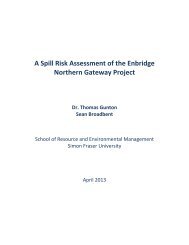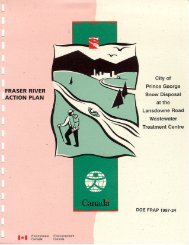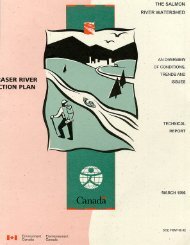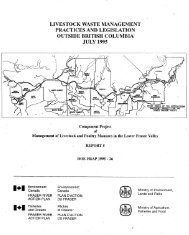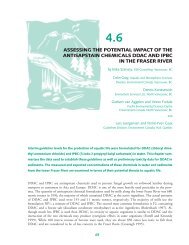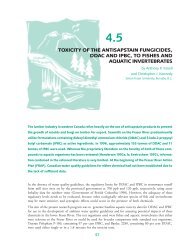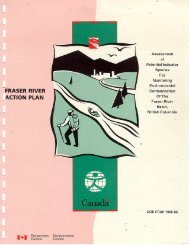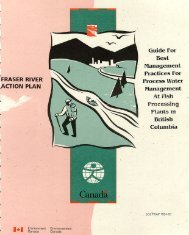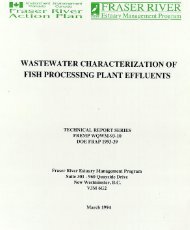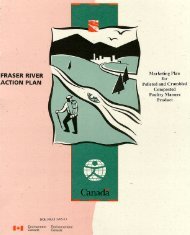Proceedings - Teaching and Learning Centre - Simon Fraser ...
Proceedings - Teaching and Learning Centre - Simon Fraser ...
Proceedings - Teaching and Learning Centre - Simon Fraser ...
You also want an ePaper? Increase the reach of your titles
YUMPU automatically turns print PDFs into web optimized ePapers that Google loves.
<strong>Fraser</strong> River Action Plan 3rd Research Workshop<br />
Abstract<br />
The <strong>Fraser</strong> River Action Plan (FRAP) is a seven-year ecosystem based initiative. Initially, it was managed<br />
jointly by the Department of the Environment (DOE) <strong>and</strong> the Department of Fisheries <strong>and</strong> Ocean (DFO). DFO’s<br />
primary concern is with rebuilding salmon stocks <strong>and</strong> protecting fish habitat. Environment Canada’s focus is on<br />
wildlife habitat, cleaning up the ecosystem <strong>and</strong> determining the environmental quality or the health of the river<br />
as well as building the framework for a management program to ensure the basin’s sustainability. DFO is<br />
delivering FRAP results in March, 1997 while DOE will complete FRAP initiatives in March, 1998.<br />
In the quest to increase the scientific underst<strong>and</strong>ing of the <strong>Fraser</strong> basin, DOE’s Environmental Quality Program<br />
supports a research network comprised of scientists from federal, provincial <strong>and</strong> university research<br />
communities. Ongoing research projects focus on: (1) The basin-wide assessment of pollution impact on aquatic<br />
quality; (2) The assessment of environmental impacts of specific pollution sources; (3) The chemical criteria<br />
development; <strong>and</strong>, (4) Ecosystems objectives development.<br />
To facilitate the review <strong>and</strong> examination of the progress of each project, Environment Canada sponsors an<br />
annual workshop. In preparation for the 1996 workshop, the research partners were asked to present information<br />
summarizing their projects, justifying the research, explaining what results have been obtained to date <strong>and</strong> to<br />
contribute to the process of “planning for the delivery of results.” During the workshop, discussion was<br />
encouraged in support of the development of a management perspective regarding future decisions <strong>and</strong> to identify<br />
information gaps which could direct future research activities.<br />
The 1996 workshop was organized into six sector- <strong>and</strong>/or geographical-based sessions including: (1) Pulp Mill<br />
Effluent Issues; (2) Transport <strong>and</strong> Sedimentation of Contaminants; (3) Urban Issues; (4) Agricultural Issues; (5)<br />
Biological Indicators; <strong>and</strong>, (6) Estuary Issues. The workshop was held on February 20-22, 1996 in Vancouver<br />
<strong>and</strong> it is the material presented there, as well as any additional supporting submissions that is the subject of this<br />
report.<br />
Acknowledgments<br />
Environment Canada would like to acknowledge the support of C. Gray, J. Culp, G. Lawrence, K. Hall, H.<br />
Schreier, T. Tuominen <strong>and</strong> P. Harrison who acted as chairs of workshop sessions, as well as all the speakers <strong>and</strong><br />
participants for their contribution by providing abstracts, papers <strong>and</strong> presentation summaries. The professional<br />
editing services of Roegan Lloydd of Gordon Enterprises <strong>and</strong> Rory Steiman of Rory Steiman & Associates is<br />
also gratefully acknowledged.<br />
Page xv



